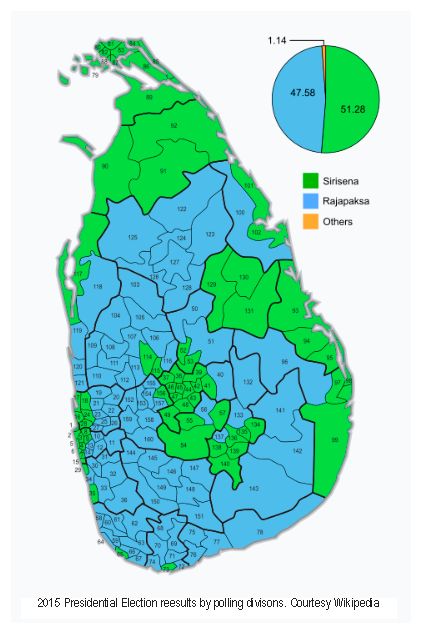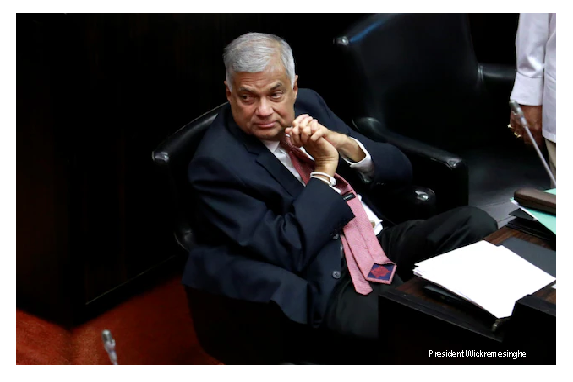
By Vishvanath
President Ranil Wickremesinghe has intensified his presidential election campaign in the North and the East parallel to electioneering in other parts of the country. He was in the North on Friday, distributing land, attending various ceremonies, launching development projects and making numerouspromises.
President Wickremesinghe has sought to endear himself to the people in the North and the East by solving their land issues under the Heritage land distribution programme. On Friday, hehad as many as 1,286 freehold land deeds distributed among the northerners in 15 Divisional Secretariat areas; he also attended a ceremony to mark the event. More freehold land deedsnumbering 13,858 are to be given away in the Mullaitivu, Kilinochchi, Vavuniya and Mannar Districts in the Northern Province, according to the Presidential Media Division (PMD).
The President has also undertaken to resolve land disputes between civilians and state institutions, such as the Forest Department and the Department of Archaeology. High-security zones are shrinking in the North with the military releasing the lands where they are located.
The PMD quoted the President as having said in the Northon Friday: “There has been a substantial reduction in the size of the high-security zone in Jaffna. The Ministry of Defence has opted to release additional lands following a specialized survey. Moreover, a portion of the land belonging to religious sites within the high-security zone has already been released. These measures are aimed at affirming the land rights of all citizens and fostering avenues for progress.”
Present at the ceremony were Minister Douglas Devananda, Members of Parliament Dharmalingam Siddharan and M. A. Sumanthiran, PC, Northern Province Governor P S M Charles, Former Member of Parliament Vijayakala Maheswaran, Jaffna District Secretary Maradalingam
Prathipan, Senior Additional Secretary to the President Chandra Herath, and various other dignitaries.
Besides, President Wickremesinghe opened a new building at the Jaffna University and promised to upgrade the Jaffna Teaching Hospital as a National Hospital. He is expected to do much for the North and the East in the coming weeks with an eye to the upcoming presidential election.
On Saturday (25), President Wickremesinghe awarded letters of appointment to 375 teachers in the Northern Province, at the Jaffna Thandai Selva auditorium.
All signs are that the next presidential election will be a close contest although some candidates claim to be riding on waves of popularity. Social media hypes are different from the ground reality. It is highly unlikely that there will be a massive swing for any candidate in areas outside the North and the East and the central hills. One need not be surprised even if none of the candidates succeeds in polling more than 50% of the total number of valid votes to secure the presidency straightaway and there arises a need for the counting of the second and third preferences to determine the winner. No presidential election,since the introduction of the presidential system in 1982, has gone into the preference-counting stage. Voters do not care to mark three preferences for presidential candidates and it is doubtful whether most of them are even aware that they can mark preferences for presidential candidates.
The SJB is floating a story that President Wickremesinghe will not contest the upcoming presidential election because he is not sure of victory. SJB S. M. Marikkar told the media the other day that President Wickremesinghe was trying to woo the minority votes, but he would not be able to secure enough votes from the majority community, and therefore he would not run for President. Such propagandistic claims cannot be taken seriously. Wickremesinghe’s entry into the contest will adversely impact the interests of SJB candidate Sajith Premadasa more than those of anyone else.
True, it will be a tall order for the UNP to increase its national vote from 2% at the 2020 general election, which it contested after the breakaway of the Premadasa faction, to more than 50% at the next presidential election to ensure its leader Wickremesinghe’s victory in the first round of counting itself. The same goes for NPP candidate Anura Kumara Dissanayake, who polled only 3 % of votes in the 2019 presidential contest.Premadasa obtained 42 % of votes in the 2010 presidential election with the help of the TNA. The JVP-led NPP hasapparently recovered a lot of lost ground, and so has President Wickremesinghe thanks to his political leadership for managing the economic crisis and bringing about a semblance of political stability.
In a closely-contested presidential election, the votes of minorities become a determining factor. Premadasa can rest assured that the SLMC will deliver most of the Muslim votes to him. The JVP/NPP does not have a strong following amongethnic and religious minorities as such, and President Wickremesinghe can be thought to stand a better chance of securing the TNA’s block votes in the North and the East. He has already bagged the plantation sector block vote for all practical purposes with the help of the Ceylon Workers’ Congress and by announcing a wage hike for the estate workers despite protests from their employers.
Wickremesinghe is aware of the importance of the block votes that the Tamil and Muslim political parties can deliver. It was thanks to them that Maithripala Sirisena became President in 2015 in spite of the then President Mahinda Rajapaksa’s immense popularity in all areas outside the North and the East and the central hills, as well as the Colombo city and some of its suburbs. This fact is borne out by a map depicting geographical distribution of the electorates that Sirisena and Rajapaksa won. (See the map.) In 2005, Wickremesinghe failed to realize his presidential dream because the LTTE ordered an election boycott in the North and the East, and the people living in areas under its control could not vote; it is popularly believed that they would have voted for Wickremesinghe overwhelmingly but for the boycott. The UNP accused the Rajapaksas of having stolen the election by bribing the LTTE into preventing the Tamils in the North and the East from voting.
Thus, President Wickremesinghe’s strategy seems to be securing block votes in the North and the East and the plantation sector to offset possible setbacks due to stiff competition from the SJB and the NPP and stigma attached to his association with the SLPP in other areas. However, it will not be a walk in the park for Wickremesinghe. The TNA is sure to make some demands that he will find extremely difficult to meet, such as the devolution of more powers to the Provinces. However, the mainstream Tamil political parties are well disposed towards him, and may not want to do anything that may ruin his political future. The TNA even backed former war-wining Army Commander General Sarath Fonseka in the presidential fray in 2010 at the behest of Wickremesinghe while accusing the army of having committed war crimes. So, Wickremesinghe must be thinking that there is no reason why the TNA cannot support him. Hope is said to spring eternal.



 Logging you in...
Logging you in... Loading IntenseDebate Comments...
Loading IntenseDebate Comments...

